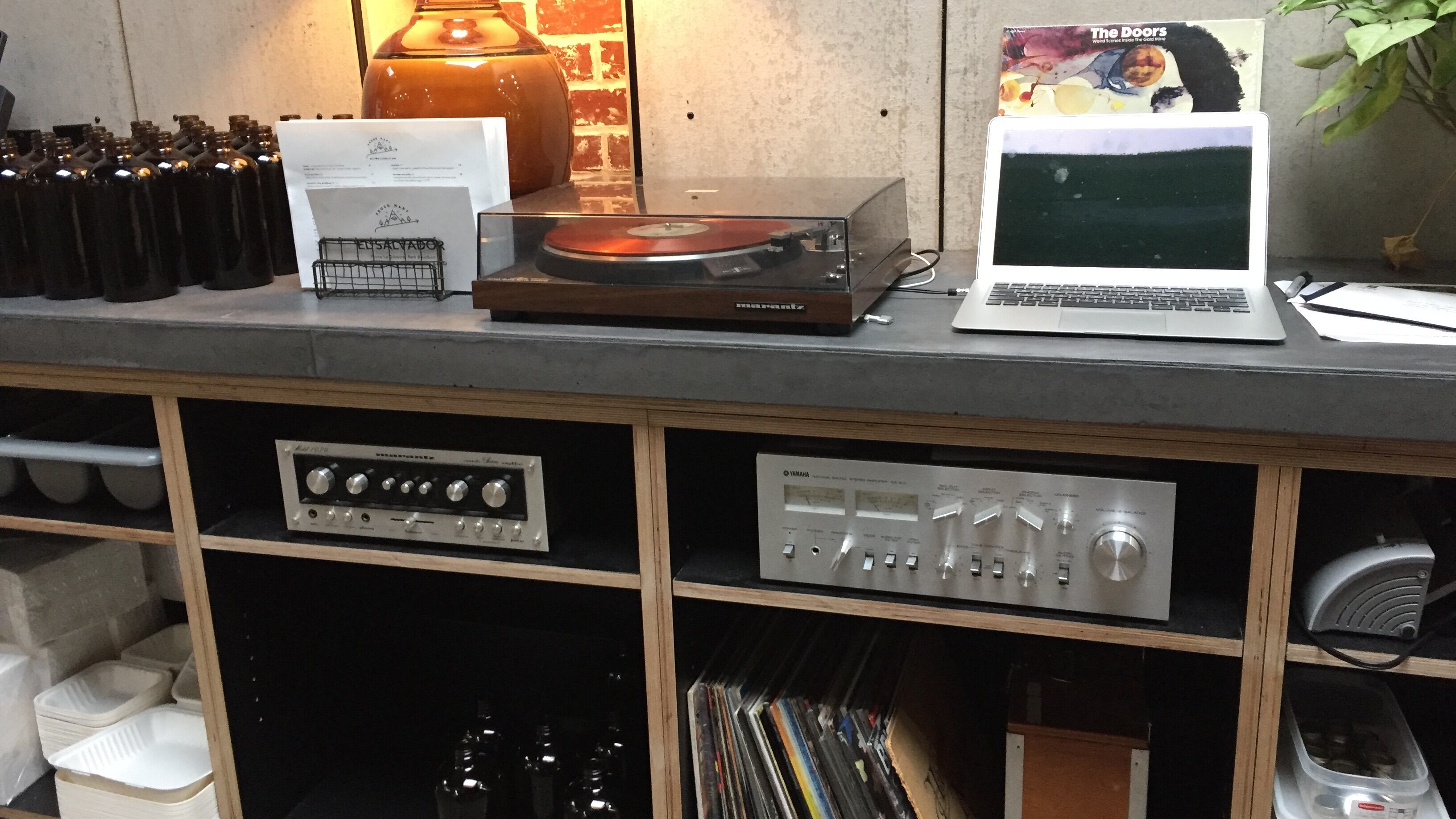I was halfway through my beer, and I couldn't believe my ears.
Hungarian guitarist Gábor Szabó's jazzy cover of "Lucy in the Sky With Diamonds" was on the stereo at Upright Brewing, and somehow the brewing room in the basement beer den sounded like the Schnitz, despite the concrete floors and walls and several huge metal tanks. The bass was forceful but controlled, the percussion snapped with precision, and you could hear every string on Szabó's Martin flat-top.
I stood up and marched into the other room to ask about it.
"Did you guys do something to your stereo?" I asked the bartender. "It sounds incredible over there."
"Oh yeah," said the bartender. "One of [Upright owner Alex Ganum's] buddies is an audio dude, and he came in and tuned it up."
"Oh man," I said, "you've gotta get me this guy's name."
The man's name is Gary Alpern. He's a former studio tech and record producer who moved to Portland from Los Angeles five years ago because he likes the vibes. He's an importer, retailer and consultant, operating out of North Portland under the name True Audiophile. Much of Alpern's work focuses on serious snobs with piles of disposable income. He puts together six-figure home stereos and charges $300-plus to do a precision alignment on an old turntable.
Which is why I shared the origin story of this article, dear reader—because if I were you, I'd be rather skeptical. Any time a newspaper is flogging a consultant who says everyone else is doing something wrong, you're right to be suspicious. So please know that I came across Alpern's work on my own and that I wasn't even primed to notice it.
"People are always stunned. They think I'm some big magician because they can hear so much more into the record, things they've listened to their whole lives and never heard all that information," Alpern says. "I'm not a magician, I didn't make the record, I'm just letting you hear into it. What's really sad is that most people never hear any of that. They're listening to a really small fraction of what's on that record, and if they heard all of it, they'd be amazed. Many of my clients say the same thing, 'I've never heard all this, and this is my favorite CD or record that I've listened to my whole life!'"
Wowed by his work at Upright, I asked Alpern to spend the morning with me, driving around to Portland coffee shops to critique their sound. I've never paid close attention to the sound in local coffee shops, but given all the vinyl and vintage equipment on display, I expected that Alpern would have some small suggestions for each, and that we'd all walk away a little wiser.
This is not what happened.
Portland cafes love the visual aesthetics of turntables and old box speakers, but the sound they're putting out is…bad. The most egregious offenders are the people making a conspicuous display of their auditory sensibilities while neglecting to tend to the most basic elements of listenability.
It makes Alpern agitated, which is why he volunteered to fix up the Upright tasting room. Most of Alpern's work focuses on high-dollar home rigs, but he works with local people on a budget. Because Upright owner Ganum is a friend, he spent a few hours and less than $1,000 turning Upright's tasting room into the best-sounding retail establishment in the city, with a couple pairs of $279 Elac speakers, four cardboard boxes and some elbow grease.
"I love their beers, and we go to their taproom, and it was just nails on a chalkboard for me to listen to the squawking. I said, 'Look, man, I will do it for free. I cannot take this anymore. I don't want it spoiling my beer,'" he says. "Everybody knows the importance of lighting—you can see it now in supermarkets, where they've done studies, and a supermarket that's lit properly, people will feel more comfortable to stay and shop more. Like lighting, if the sound is appeasing, you'll spend more time in there, you'll buy more products because you'll feel more comfortable."
Here's how we spent a morning without much comfort.

Barista
1725 NE Alberta St., baristapdx.com/alberta.
Playing: S. Carey, the drummer of Bon Iver.
The system: A laptop and eight ceiling speakers that came installed in the mixed-use building.
Billy Wilson's chain of five coffee shops are known for their sparse aesthetic and focus on skilled staff who do a great job executing espresso drinks. My Americano was perfect and Alpern's chai was good. The wraparound banquettes give the room a nice open feel. Sadly, the sound was hardly worth talking about.
The issue was a lack of sound pressure from the overhead speakers. Essentially, you're getting the sonic experience you get in an elevator.
"It's a clean installation, so it doesn't get in the way of anybody's eyeline—at the same time, it's hidden and so is the sound," Alpern says. "The ambience was good, though."

Proud Mary
2012 NE Alberta St., 503-208-3475, proudmarycoffee.com.
Playing: The second half of Pearl Jam's Ten and John Holt's original reggae version of "The Tide Is High."
The system: A vintage Marantz amp, a Yamaha tuner, a vintage Marantz turntable and a MacBook all running over JBL speakers, which are meant to be paired and sitting on the floor but which here were hanging as single-monitor speakers in seemingly random places.
Proud Mary is plenty proud. Before he even opened, owner Nolan Hirte was already wingeing about the poor quality of service at Portland's top roasteries and bragging about how there was no risk opening here because Portland had "nothing." There's much to like about this new shop—it's one of our favorite new coffee spots in town—but the sound is a garbage fire. Not for lack of effort, either, because the shop tracked down vintage gear.
The word Alpern used was "tragic." Proud Mary appeared to be trying very hard, and yet, because of the poor implementation, it turned into a "horror show."
"You have paired speakers hung up as monitor speakers all over the place," says Alpern. "And then they used the thinnest cable possible—it looked like about 20 gauge—so that's not carrying enough bass energy anyway. Then they're placed all over the place, they're not firing in the right places in terms of the customers' ears. You were sitting against the wall, so you were getting some reflected bass energy—smeared, tubby bass—but I was sitting a few inches away, and I didn't get even that."

Prince Coffee
2030 N Willis Blvd., princecoffeepdx.com.
Playing: Lauryn Hill's The Miseducation of Lauryn Hill
The system: A 1974 Bang & Olufsen receiver with Infinity bookshelf speakers.
Kenton's cozy little coffee shop, Prince, is a small, pleasant space—doubly so thanks to its house stroopwafels. It had a little bookshelf system with modest speakers.
"They didn't even try," Alpern says. "However, at least it was an honest presentation, and the speakers were coupled on the shelf, so at least they were giving you frequency response."
There's an easy fix to making this system better—just by moving the speakers around a little.
"They should reposition the speakers, spreading them out further and toeing them in, to get a better soundstage," Alpern says.

Deadstock
408 NW Couch St., 971-220-8727, deadstockcoffee.com.
Playing: Kodak Black's "Patty Cake"
The system: Bose SoundTouch 20 III. (Deadstock also has a locally made Case of Bass speaker on the wall that is sometimes used.)
Confession time: I am a big fan of Bose. The brand is loathed by audiophiles, but the sad fact is that most Americans cannot properly set up their living-room stereo. (In fact, my own living-room stereo is poorly set up, because my loving wife will not let me move the speakers.)
Bose speakers are designed for the contemporary ignoramus, with direct and reflective elements built into the box. You cannot fuck them up, which is why the average American should just buy them.
And you know what? From where we were seated, the SoundTouch 20 III sounded the best of anything all day. Alpern shared my enthusiasm for the vibe created by Deadstock owner Ian Williams, even if he could not quite bring himself to praise a Bose speaker available at Target.
"He was true to the experience, and it's a cool little spot," says Alpern. "It was just kinda thud, thud, thud. But if you're sitting right next to it, it's a little Bose system and became innocuous."

Stumptown Downtown
128 SW 3rd Ave., stumptowncoffee.com.
Playing: Roy Orbison's "Only the Lonely"
The system: A turntable and hidden speakers driven by a glowing vintage McIntosh amp.
This was my pick as the probable winner, as I'd remembered being impressed by it a few years back. Unfortunately, the main space is being renovated, so Stumptown is staging a "pop-up" next door and the audio system is crammed where it'll fit in the tiny alcove.
Alpern isn't sure it'll sound any better when it gets unpacked. Vintage equipment can be great, but it needs to be serviced. Alpern points out that anything from the '70s needs to be, at minimum, "recapped," which means replacing the capacitors that store and filter energy. Capacitors of that vintage die after about five years of use.
"This whole thing where people say, 'I like vintage because it's warm,'" he says. "That's stupidity. They were never designed to sound like that."
These are consumer electronics, and the capacitors and diodes were never intended to last 50 years.
"To borrow something from a scumbag: sad," he says. "Maybe the chassis is forever and the resistors are forever, but the capacitors are not. You will lose more and more and more frequencies until you have muddy sound, and that's what it was."

Courier Coffee
923 SW Oak St., couriercoffeeroasters.com.
Playing: The-Dream's Love vs. Money
The system: Hitachi tuner amplifier, one Boston speaker with a crushed tweeter, another random mismatched speaker, a stack of Shure replacement needles.
Courier is conspicuously Portlandy in every way. From an audio standpoint, that means a big crate of vinyl and replacement needles on display. It proudly displays the record currently spinning. It has two mismatched bookshelf speakers stacked up, one of which is physically damaged. The shop was crowded, but it sounded like garbage.
Alpern pointed out that the most basic elements of setting up a turntable appeared to have been ignored—things any kid in the '70s would have known but which have been totally ignored by the hipsters buying up vinyl and destroying it with needles. For example, Courier's turntable read that the needle weight was set to an absurdly light weight.
"I called a guy who is a turntable expert just to check and asked him, and he said that there's no cartridge in the world that's a 0.8 gram," Alpern says, "so it's either inaccurate because they didn't set it up right or it's a travesty that they thought that sounded good."
How, I wonder, would Courier like it if a local business bought Courier's beans then served a pot of lukewarm, burnt coffee next to a "Proudly serving Courier" sign? Why would you do that to a musician you love?
Alpern more or less agreed.
"They work so hard on their product that they create and their service," he says, "and yet they enter into something they have no idea about. And worse, they try to showcase it, and it's just offensive on every level—even subliminally, and especially subliminally." ¨

